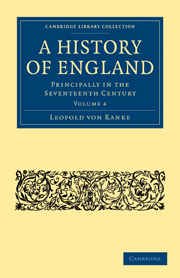Book contents
- Frontmatter
- Contents
- BOOK XVI THE LATER YEARS OF CHARLES II, 1675—1685 WHIGS AND TORIES
- INTRODUCTION
- CHAP. I Parliament in 1675. Formation of new parties
- CHAP. II The fourteen months' prorogation. Parliamentary Session of 1677
- CHAP. III Dynastic and political alliance of Charles II with the Prince of Orange
- CHAP. IV Complications at the conclusion of the Peace of Nimuegen. Alliance of Louis XIV with the Parliamentary opposition in England
- CHAP. V Denunciation of a Jesuit conspiracy. Last Session of the Parliament of the Restoration
- CHAP. VI Parliament of 1679
- CHAP. VII Parliamentary interim, 1679, 1680
- CHAP. VIII The Parliamentary Session of 1680
- CHAP. IX Parliament at Oxford, March 1680, 1681
- CHAP. X Antagonism of the Prince of Orange and the Duke of York
- CHAP. XI Reaction against the Whigs. Rye-House Plot. Execution of Lord William Russell
- CHAP. XII End of Charles II's Government
- BOOK XVII REIGN OF JAMES II, FEBRUARY 1685 TO SEPTEMBER 1688
- BOOK XVIII THE FALL OF JAMES II IN ITS CONNEXION WITH THE EUROPEAN CONFLICTS WHICH MARKED THE CLOSE OF 1688
- BOOK XIX COMPLETION OF THE REVOLUTION IN THE THREE KINGDOMS, 1688—1691
CHAP. VII - Parliamentary interim, 1679, 1680
Published online by Cambridge University Press: 07 September 2011
- Frontmatter
- Contents
- BOOK XVI THE LATER YEARS OF CHARLES II, 1675—1685 WHIGS AND TORIES
- INTRODUCTION
- CHAP. I Parliament in 1675. Formation of new parties
- CHAP. II The fourteen months' prorogation. Parliamentary Session of 1677
- CHAP. III Dynastic and political alliance of Charles II with the Prince of Orange
- CHAP. IV Complications at the conclusion of the Peace of Nimuegen. Alliance of Louis XIV with the Parliamentary opposition in England
- CHAP. V Denunciation of a Jesuit conspiracy. Last Session of the Parliament of the Restoration
- CHAP. VI Parliament of 1679
- CHAP. VII Parliamentary interim, 1679, 1680
- CHAP. VIII The Parliamentary Session of 1680
- CHAP. IX Parliament at Oxford, March 1680, 1681
- CHAP. X Antagonism of the Prince of Orange and the Duke of York
- CHAP. XI Reaction against the Whigs. Rye-House Plot. Execution of Lord William Russell
- CHAP. XII End of Charles II's Government
- BOOK XVII REIGN OF JAMES II, FEBRUARY 1685 TO SEPTEMBER 1688
- BOOK XVIII THE FALL OF JAMES II IN ITS CONNEXION WITH THE EUROPEAN CONFLICTS WHICH MARKED THE CLOSE OF 1688
- BOOK XIX COMPLETION OF THE REVOLUTION IN THE THREE KINGDOMS, 1688—1691
Summary
The terror of conspiracy still possessed the minds of all men; all still considered themselves seriously threatened with a rising of the Papists. The streets were closed with chains at important places, and the militia was kept in readiness to quell at once any rising disturbance. In the transactions of the law-courts, which conducted such trials as did not concern members of Parliament, no less interest was shown by the people than in the Parliamentary debates. Again and again Oates and his associates, above all Bedlow, appeared at the trials to repeat old statements or to add new ones of increased force; the judges and the juries always had an overwhelming inclination to condemn. Coleman and three Jesuits had already perished on the scaffold. In June 1679 five other Jesuits, in spite of their protestations of innocence, were condemned and hanged at Tyburn. They were followed by Langhorne, a barrister of repute, who had been tempted in vain to save his life by consenting to denounce his fellow conspirators. Some impression however was made in these trials by the method of defence, which consisted in proving the contradictions and general untrustworthiness of the accusers. Even Chief Justice Scroggs, who till now, whilst most of the other judges had kept quiet, had conducted the proceedings with the zeal of a violent opponent of Catholicism, was confounded by the fact that great improbabilities, if not impossibilities, appeared in Bedlow's statement.
- Type
- Chapter
- Information
- A History of EnglandPrincipally in the Seventeenth Century, pp. 87 - 105Publisher: Cambridge University PressPrint publication year: 2010First published in: 1875



